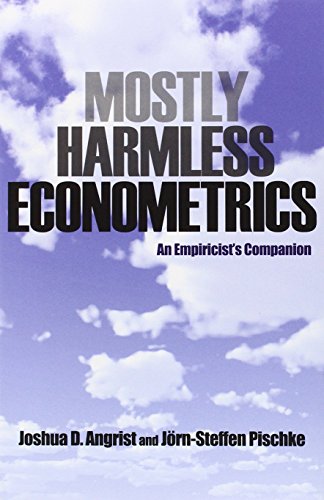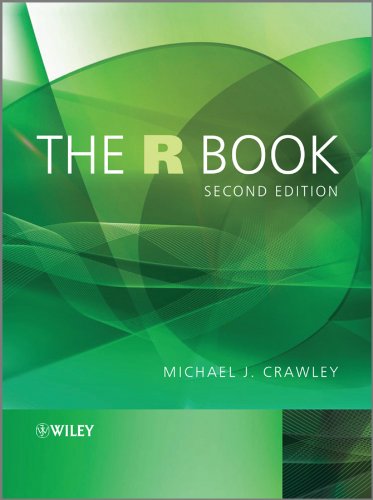Top products from r/rstats
We found 27 product mentions on r/rstats. We ranked the 46 resulting products by number of redditors who mentioned them. Here are the top 20.
1. R for SAS and SPSS Users (Statistics and Computing)
Sentiment score: 1
Number of reviews: 2
 Show Reddit reviews
Show Reddit reviews3. R for Data Science: Import, Tidy, Transform, Visualize, and Model Data
Sentiment score: 0
Number of reviews: 2
O Reilly Media
 Show Reddit reviews
Show Reddit reviews5. Regression Modeling Strategies: With Applications to Linear Models, Logistic Regression, and Survival Analysis (Springer Series in Statistics)
Sentiment score: 1
Number of reviews: 1
 Show Reddit reviews
Show Reddit reviews6. Forecasting models – an overview with the help of R software: Time Series Prediction - Past, Present and Future (Machine Learning)
Sentiment score: 1
Number of reviews: 1
 Show Reddit reviews
Show Reddit reviews7. Statistics: The Exploration & Analysis of Data (Available Titles Aplia)
Sentiment score: 1
Number of reviews: 1
Used Book in Good Condition
 Show Reddit reviews
Show Reddit reviews8. Mostly Harmless Econometrics: An Empiricist's Companion
Sentiment score: 0
Number of reviews: 1
Princeton University Press
 Show Reddit reviews
Show Reddit reviews9. Data Analysis Using Regression and Multilevel/Hierarchical Models
Sentiment score: 0
Number of reviews: 1
Cambridge University Press
 Show Reddit reviews
Show Reddit reviews10. Mathematical Statistics with Applications
Sentiment score: 1
Number of reviews: 1
 Show Reddit reviews
Show Reddit reviews13. Forecasting models – an overview with the help of R software: Time Series Prediction - Past, Present and Future (Machine Learning Book 4)
Sentiment score: 1
Number of reviews: 1
 Show Reddit reviews
Show Reddit reviews15. Elementary Statistics: Picturing the World, Books a la Carte Edition (6th Edition)
Sentiment score: 1
Number of reviews: 1
 Show Reddit reviews
Show Reddit reviews16. Deep Learning (Adaptive Computation and Machine Learning series)
Sentiment score: 1
Number of reviews: 1
The MIT Press
 Show Reddit reviews
Show Reddit reviews17. Econometric Methods with Applications in Business and Economics
Sentiment score: 1
Number of reviews: 1
Oxford University Press USA
 Show Reddit reviews
Show Reddit reviews18. Applied Longitudinal Data Analysis: Modeling Change and Event Occurrence
Sentiment score: 1
Number of reviews: 1
 Show Reddit reviews
Show Reddit reviews






For hardware demands, large datasets won't be as big of an issue as model complexity, but given that modern computing demands keep going up, I think 16 GB should be standard for anyone getting a new computer. You'll be less likely to need to make an upgrade in the near future when OS and other software demands require you to do so. The bigger thing to consider is the read/write speed of your hard drive, so definitely go with an SSD. This will also help with power consumption and durability. For your CPU, R doesn't default to using multiple cores, so you'll want to look at single-core benchmarks when picking out your machine. With that being said, R does use multiple threads on a single core, so I wouldn't settle for an i5. But if you're using MCMC, a multicore CPU can be a lifesaver since you can assign your chains to run on different cores in parallel.
I hope that helps. Good luck with your purchase!
Quick and dirty answer: speaking very broadly, random forests -- found in the "randomForest" package -- tend to win battle-of-the-algorithms type studies. If you just want to play with a single model, I'd recommend starting with that and looking at the help for it.
Longer and better answer: Your best bet to answering all these questions and getting a good handle on data mining/predictive analytics is this book: Applied Predictive Modeling. The book references the "caret" package quite a bit, since the package's author is the same person. With it, you can train a lot of different types of models for regression or classification optimizing for accuracy, RMSE, ROC, etc. It provides a standard API for playing with models and makes your life much, much easier. It has its own website here.
My advice would be to find a dataset for yourself that you wish to analyse in some manner and work through that using the references you have and Stackoverflow to search for solutions to problems you encounter (and asking when you can't find a solution).
This is because, in my experience, most exercises are canned and have perfect working solutions provided, yet when you get to the real world working on your own data things are never perfect and you will have a lot of problems to solve.
One very useful thing I can recommend is to start learning how to use Knitr as a basis for making your work-flow from importing data through to producing reports (in LaTeX or HTML via R markdown) completely reproducible.
A couple of useful references though are the following books which all have R examples...
The authors of the last two books do an online course Statistical Learning based on the Intro to Stat Learning book if you want to work through a course. I did this last year but am yet to put much of it into practice yet (and consequently have forgotten the majority of it, but the PDFs linked above will be very useful when I get round to using the methods).
I can recommend Applied Longitudinal Data Analysis: Modeling Change and Event Occurrence by Judith Singer & John Willett.
The second half of the book considers survival analysis, and R code for the examples from each chapter of the book are available here -- in addition to code for SAS, SPSS Stata, etc.
Full disclosure: I have only worked through the first half of the book so far (growth curve modeling), but the text is very complete and the code on that webpage has been really helpful. I imagine the section on survival analysis is similarly helpful.
Deep Learning With Python is very good for practical application, as is the course at fast.ai. For theory, people love Goodfellow.
> I'd like to know, how did you learn to use R?
My batshit crazy lovable thesis advisor was teaching intro datascience in R.
He can't really lecture and he have high expectation. The class was for everybody including people that don't know how to program. The class book was advance R http://adv-r.had.co.nz/... (red flag).
We only survived this class because I had a cs undergrad background and I gave the class a crash course once. Our whole class was more about how to implement his version of random forest.
I learned R because we had to implement a version of Random forest with Rpart package and then create a package for it.
Before this a dabble in R for summer research. It was mostly cleaning data.
So my advice would be to have a project and use R.
>how did you learn statistics?
Master program using the wackerly book and chegg/slader. (https://www.amazon.com/Mathematical-Statistics-Applications-Dennis-Wackerly/dp/0495110817)
It's a real grind. You need to learn probability first before even going into stat. Wackerly was the only real book that break down the 3 possible transformations (pdf,cdf, mgf).
Feedback would be greatly appreciated on this one. It's a prototype analysis for a book idea I had.
I'm toying with the idea of writing a book about statistical analyses of classic games. The target audience would be mathematically interested laypeople, much like Jeffrey Rosenthal's book Struck by Lightning ( https://www.amazon.ca/Struck-Lightning-Jeffrey-S-Rosenthal/dp/0006394957 ).
The twist would be that chapter would contain step-by-step R code or Python code so that the reader could do the same analysis and make changes based on their own questions.
I really enjoy using this book for reference material. It depends on what you are trying to learn, though. You won't find code examples in it.
What you will find, however, is a ton of different methods and examples of how to apply them (contextually). You'd probably need to have a least a basic idea of how to begin the analysis to make it useful. (For instance, I'm modeling a binary event, I need a logit or probit, start w/ that chapter; or I'm modeling a rank, Tobit).
I recommend you to first study probability theory, (formal definitions, variable independence, moments, limit theorems, and some distributions) this is my favorite course, but it's in spanish http://lya.fciencias.unam.mx/lars/0625/, then I recommend this course in MIT: http://ocw.mit.edu/courses/electrical-engineering-and-computer-science/6-041sc-probabilistic-systems-analysis-and-applied-probability-fall-2013/ it's going to take you a couple months to finish it, it's a lot of material, you can complement the material with this course http://oli.cmu.edu/courses/free-open/statistics-course-details/ (it has some r exercises). and in the road, try to make all the ocw homeworks on r, using Rmd, and some latex. Use the R book as a reference http://www.amazon.com/The-Book-Michael-J-Crawley/dp/0470973927
Learning R, is more about learning the math behind probability and the basic concepts of statistics than learning the language.
, 2, 3, 4, 5, 6, 7, 8, 9
descriptives:
summary,by,aggregate,apply,tapply,sapplyetc...... also
plot,hist,boxplot,stripchart,barplot,dotchartetct-tests:
t.test(paired-t, independent samples Welch t, independent samples equal-variance t),ANOVA:
lm,aov. Alsoanovaitself produces anova tables from a variety of model outputcorrelation:
corregression:
lmThree very good introductory textbooks for statistics are:
Mendenhall, Statistics https://www.amazon.com/Introduction-Probability-Statistics-William-Mendenhall/dp/1133103758
Larson and Farber https://www.amazon.com/Elementary-Statistics-Picturing-World-Books/dp/0321901118
Peck and Devore https://www.amazon.com/Statistics-Exploration-Analysis-Available-Titles/dp/0840058012
Buy used, older editions of each, and you can get them very cheap. These are all well explained, beginner texts.
I didn't know about
MLRuntil this post. So without having spent any time with it whatsoever, I would only say that one of the nice things about thecaretpackage is that you can also leverage Kuhn and Johnson's book, Applied Predictive Modeling, as well as YouTube videos of Max Kuhn discussingcaret.Both JAGS and BUGS use the same language and can perform very similar operations. JAGS is more portable across operating systems, so for that reason, I would suggest JAGS (BUGS is generally limited to Windows). However, documentation/blog posts/forum posts (which exist in abundance!) for both languages will generally work for either tool. If you are looking for a textbook, Doing Bayesian Data Analysis provides a nice introduction to both bayesian statistics as well as JAGS.
Outside of JAGS/BUGS, there exists another similar language for performing Bayesian statistics called Stan (also described in the above book). Stan is newer, and often times will "run faster" than JAGS, however it does not directly support as many types of analyses.
My advice would be to learn JAGS while simultaneously learning the basics of Bayesian methods. Once you understand the basics of JAGS, try exploring Stan!
I used data camp and I recommend it because it covers both programming in base R and the full tidyverse library. I did the R programming course and it covered everything from functional programming to object oriented programming in R.
If you don’t want to do a monthly subscription, purchase Hadley Wickams (author of the tidyverse) book R for Data Science
https://www.amazon.com/Analysis-Regression-Multilevel-Hierarchical-Models/dp/052168689X is the definitive text on the subject. I highly recommend this book to understand the fundamentals of multilevel modeling.
you check the following book
Forecasting models – an overview with the help of R software : Time series - Past ,Present and Future
https://www.amazon.co.uk/dp/B07VFY53B1 (E-Book)
https://www.amazon.com/dp/1081552808 (Paperback)
ISBN: 9781081552800
You might check out Dr. Gerbing's work at Portland State U. He teaches stats in the business school and uses R.
http://www.pdx.edu/sba/david-gerbing
He even wrote a textbook you might find useful:
http://www.amazon.com/dp/0415657202/
I haven't read it yet, so I don't know how helpful it will be.
Mostly Harmless Econometrics is a classic. It gets into regression, but also design with inference in mind. Combine that with ISLR and you should be set!
This should get you started to port over some existing skills. You can then fill in the rest with one of the suggested references.
R for SAS and SPSS Users (Statistics and Computing) https://www.amazon.com/dp/1461406846/ref=cm_sw_r_cp_awd_2doPwbMVQTRYH
Try this or this
Here's the direct link to the book on Amazon.